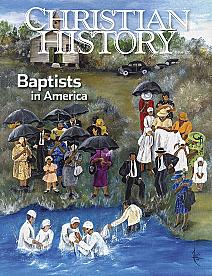John Smyth's Theology Wavered but he Founded the Baptists
THE BAPTISTS cannot point to a single pre-eminent founder the way Lutherans, Calvinists, Presbyterians, Methodists, or many other groups can. However, one of the men most influential in shaping the early movement was John Smyth, even if he was a Baptist only briefly.
Born around 1570, Smyth studied at Christ’s College. Although he had Puritan leanings, he was still a member of the Church of England when he accepted a position as lecturer to the Corporation of the City of London on this day, 27 September 1600. But his changing views led to his expulsion within a couple of years, as he became a Separatist, one who abandoned the Church of England as unbiblical.
Conditions in England were not easy for Separatists, so he fled to the European continent. In Amsterdam, his study of the Bible led him to renounce infant baptism and re-baptize himself and his adult followers, thus forming the first Baptist church.
However, Smyth was a changeable man, moving from enthusiasm to enthusiasm. He developed a theory that an English language translation of the Bible was the equivalent of the apocrypha. Only Hebrew and Greek should be used in church and no other writing, not even a hymnbook, because he thought spiritual worship springs from the heart. His associates considered this nonsense.
In the course of time, the volatile Smyth encountered Mennonites (an Anabaptist group) and concluded that their views were the correct ones. As a result, he broke with his own followers. However, the Mennonites rejected him and Smyth died soon afterward.
But Smyth’s views remained at the heart of Baptist theology and church government. Like many modern Baptists, Smyth limited church leadership to two offices, that of pastor and deacon (in contrast to many modern Reformed churches which have pastors, elders, and deacons). He argued for church autonomy and separation of church and state, as well as believer’s baptism.
—Dan Graves
----- ----- -----
For more about Smyth, read "From outlaws to patriots" in Christian History #126, Baptists in America






